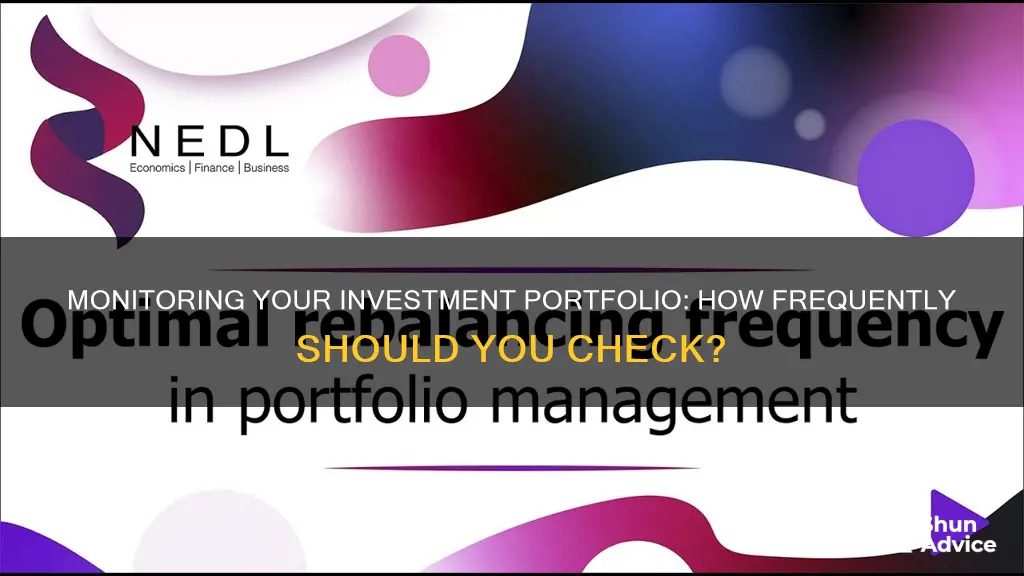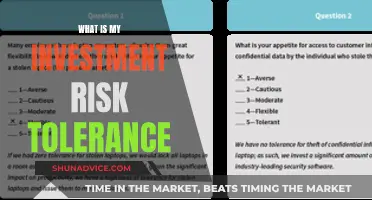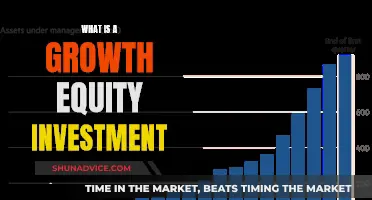
It's natural to want to monitor your investment portfolio, but how often is too often? Checking your investments too frequently can lead to stress and poor decision-making. It can also be a waste of your time, as there's usually not a lot to see from daily changes.
As a general rule, it's recommended to check your investments every one to six months. This will keep you up to date on your portfolio without causing unnecessary stress. Some investors opt for once per quarter as a happy medium.
If you're a long-term investor, checking your portfolio daily may not be helpful. Constantly checking your investments can make you more susceptible to rash decision-making and ultimately increase the risk of losing money.
However, if you're a frequent or daily trader, you may benefit from checking your investments as often as possible to take advantage of short-term fluctuations.
At the end of the day, the most important thing is not how often you check your investments, but how you react to the moves you see.
| Characteristics | Values |
|---|---|
| How often one should check their investment portfolio | There is no one-size-fits-all answer to this question. It depends on factors such as the temperament of the investor and their willingness to spend time managing their investments. However, experts generally advise against checking too frequently, as it can lead to emotional investing, impulsive decisions, and underperformance. |
| Recommended frequency by experts | Most experts recommend checking investment portfolios periodically, ranging from once a month to once a year. Some suggest checking every two or three months to ensure no dramatic changes have occurred. |
| Potential consequences of checking too frequently | Checking investment portfolios too often can lead to emotional investing, impulsive decisions, and a preoccupation with short-term fluctuations rather than long-term growth. It can also increase costs and taxes from capital gains. |
| Benefits of checking periodically | Checking investments periodically allows investors to rebalance their portfolio, maintain appropriate risk levels, and reaffirm their investment strategy. It also helps avoid the stress and emotional reactions associated with frequent monitoring. |
| Strategies to avoid over-checking | To avoid checking investment portfolios too frequently, investors can create a monitoring plan, adopt a long-term approach, and seek professional assistance from financial advisors or robo-advisors. |
What You'll Learn

Emotional investing
Firstly, it is important to understand the motivations behind emotional investing. Investors often buy at market tops and sell at market bottoms due to media hype or fear. This can be exacerbated by the ease of access to investment information through apps and other technologies, leading to high-frequency monitoring. However, this can cause investors to become more sensitive to losses than gains, a phenomenon known as myopic loss aversion.
To avoid emotional investing, it is recommended to check your portfolio as little as possible. While this may be challenging, it is crucial to stick to a monitoring plan and not give in to the fear of missing out. It is also beneficial to adopt a long-term approach, keeping in mind your financial goals and risk tolerance. If needed, seek professional assistance from a financial advisor who can help manage your investments and provide guidance.
Additionally, investors can implement strategies such as dollar-cost averaging and diversification to make consistent, emotion-free decisions. Dollar-cost averaging involves investing equal amounts of money at regular intervals, regardless of market conditions. Diversification involves investing in a range of industries, geographies, and types of investments to reduce the emotional response to market volatility.
By recognising the pitfalls of emotional investing and implementing strategies to avoid it, investors can make more rational and realistic decisions, ultimately improving their long-term performance and achieving their financial goals.
Savings Investment Strategies: Accessibility and Growth
You may want to see also

How often is too often?
There is no one-size-fits-all answer to the question of how often one should check their investment portfolio. It depends on factors such as the investor's temperament, their financial goals, and the length of their investment strategy. However, experts generally advise against checking your portfolio too frequently, as it can lead to emotional investing and impulsive decisions that may hurt your returns in the long term.
The risks of over-checking your portfolio
The increased accessibility of investment information through apps and other digital platforms has made it easier than ever to monitor your investments closely. However, this easy access can also be detrimental to your financial health. Checking your portfolio too often can lead to what is known as "high-frequency monitoring" or "myopic loss aversion". This means that the more frequently you check your portfolio, the more likely you are to make impulsive decisions based on short-term market fluctuations, rather than a long-term investment strategy.
Research shows that investors who monitor their portfolios too frequently become more sensitive to losses than to gains. This can lead to a cycle of buying and selling at the wrong times, racking up excess trading costs, and ultimately underperforming compared to those who trade less frequently.
So, how often is too often?
While there is no perfect answer, experts advise that checking your investments once a month is a good minimum guideline. Ivory Johnson, a CFP and founder of Delancey Wealth Management, suggests waiting even longer, recommending investors take a cursory look every two or three months to ensure there are no dramatic changes. This longer-term approach allows you to avoid the stress and emotional reactions that can come with frequent monitoring.
At the very least, it is recommended to review your investments annually to ensure your portfolio is performing as expected and is still suitable for your financial goals.
Strategies to avoid over-checking
If you find yourself struggling to resist the temptation to check your portfolio too often, consider implementing a monitoring plan that gradually increases the time between checks. For example, you can start by checking daily, then advance to weekly, monthly, and so on.
Another strategy is to adopt a long-term approach to investing. Remind yourself that short-term fluctuations are normal and that you are investing for the long term. This can help you maintain a more patient and disciplined mindset.
Finally, if you feel that you cannot control the urge to check your portfolio frequently, consider seeking professional assistance from a financial advisor. They can provide helpful tips and guidance to manage your investments in a more disciplined and effective manner.
Savings and Investments: Equation for Financial Success
You may want to see also

The drawbacks of over-checking
Checking your investment portfolio too often can have several negative consequences for your financial strategy and mental health.
Firstly, it can lead to emotional investing and impulsive decisions. The more frequently you check your portfolio, the more likely you are to make knee-jerk reactions to short-term market fluctuations. This can result in buying or selling stocks based on temporary changes rather than long-term growth potential, which can hurt your returns and cause you to miss out on opportunities for wealth accumulation.
Secondly, over-checking can cause unnecessary stress and anxiety. The stock market is volatile, with frequent ups and downs, and checking your portfolio too often can make you feel like it is performing worse than it is. This can lead to a heightened perception of risk and a greater sensitivity to losses than gains, a phenomenon known as myopic loss aversion.
Additionally, over-checking your portfolio may result in excessive trading and higher costs. Every trade incurs costs, and by reacting to every small change in the market, you may end up paying more in fees and missing out on the long-term gains that come with a more patient approach.
Finally, over-checking can take away from your long-term financial strategy. Investing is typically a long-term endeavour, and constant monitoring can distract from your initial financial goals and lead to short-sighted decisions. It is important to trust the process and maintain a bird's-eye view of your investments, making adjustments only when necessary and in line with your overall strategy.
In conclusion, while monitoring your investment portfolio is essential, doing so too frequently can lead to emotional investing, impulsive decisions, increased stress, and a deviation from your long-term financial plan.
Savings and Investment: Understanding the National Identity
You may want to see also

How to avoid over-checking
Checking your investment portfolio too often can lead to emotional investing and impulsive decisions, such as buying or selling based on short-term market fluctuations. This can cause more harm than good, deterring you from making long-term investments that can give you bountiful returns. So, how do you avoid over-checking your portfolio?
Firstly, it is important to remember that there is no "right" answer to how often you should check your portfolio. It depends on how much time you want to spend managing your investments and your temperament when it comes to seeing daily changes in value. However, if you are investing for the long term, there is no need to check your stocks more than once a month.
To avoid over-checking, you can try drafting a monitoring plan. Decide on a frequency that works for you and stick to it. If you are a victim of FOMO (fear of missing out), start with shorter intervals, such as once a day, and gradually increase the time between checks to a week, a month, and so on.
Another strategy is to adopt a long-term approach. Investing in the stock market is best for money that you won't need for at least 5-7 years. Keeping this in mind can help you limit the frequency of checking your stock prices. Focus on your financial goals rather than short-term market movements.
If you are unable to refrain from checking your portfolio, consider seeking professional assistance from a financial advisor. They can provide helpful tips, help you control your urge to over-check, and keep you on track with your plan. Alternatively, you can entrust your investments to a financial advisor, who can monitor, trade, and rebalance your portfolio on your behalf.
Remember, when it comes to investing, less is more. Create a sensible plan according to your risk comfort level and rebalance your portfolio regularly. Checking your investments once a month is a good minimum, while three or six months, or even once a year, are ideal frequencies.
Monetary Policy: Investing and Saving Explained
You may want to see also

Seeking professional help
While there is no definitive answer to how often you should check your investment portfolio, experts advise doing so as little as possible. Checking your portfolio too frequently can lead to impulsive decision-making and a higher risk of losses. It is recommended that investors review their portfolios at least annually, with some suggesting a cursory look every two to three months to ensure no dramatic changes.
If you are unsure about how often to review your portfolio or are considering seeking professional advice, there are several factors to consider. Firstly, understand the fees involved and be wary of advisors who receive additional payments from third parties, as this may indicate a conflict of interest. A good advisor should provide unbiased advice and put your interests first.
Secondly, determine the services you require and what you are paying for. Most advisors will conduct at least an annual review, with more frequent reviews for clients with larger sums invested. Additional services may include tax preparation, estate planning, and legal advice.
Thirdly, assess the advisor's background and experience. Check for any violations using a free service like BrokerCheck, provided by the Financial Industry Regulatory Authority (FINRA). Ensure your advisor is providing leading-edge advice and is up-to-date with market trends and changes in tax law.
Finally, consider the level of risk you are comfortable with and ensure your advisor understands your risk tolerance. A good advisor will help you balance your portfolio's ratio of stocks to bonds, taking into account your age, financial goals, and risk appetite.
Remember, the role of a financial advisor is to help you make important financial decisions and provide advice tailored to your goals and circumstances. Don't be afraid to ask questions and seek clarification if you are unsure about anything.
Understanding Portfolio Investment Entities: Definition and Overview
You may want to see also
Frequently asked questions
There is no definitive answer to this question. Some experts advise checking your portfolio once a month, while others suggest waiting two to three months to ensure there are no dramatic changes. It is recommended that you review your investments at least annually to ensure your portfolio is performing as expected.
Checking your portfolio too often can lead to emotional investing and impulsive decisions, such as buying or selling based on short-term market fluctuations. This can result in underperformance and missed opportunities for long-term growth, as well as unnecessary stress and anxiety.
Yes, you can use robo-advisors, which are software platforms that use algorithms to manage your investment portfolio. These tools can help you maximise your returns, maintain your risk tolerance, and automatically adjust your investments through rebalancing.







